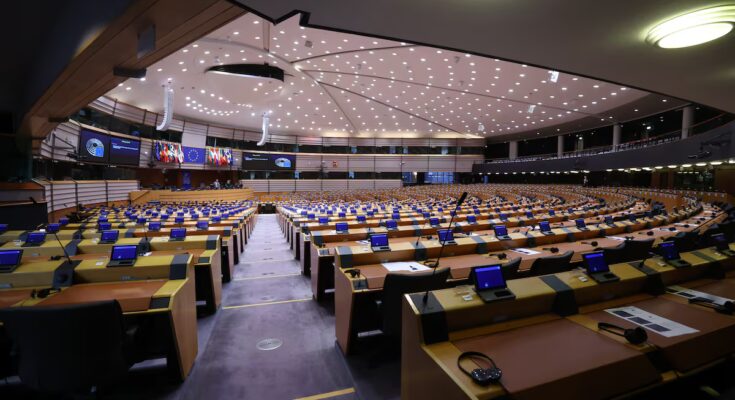Bittersweet day for the climate ambitions of the European Union and dark for those who hoped to contain the ultra agenda in the heart of Europe. This Thursday, European conservatives joined forces with the most right-wing groups in the Chamber to advocate for a drastic reduction in rules requiring corporate responsibility from large companies regarding human rights and the environment. While the climate summit is held in the Brazilian city of Belém and one after another scientific reports warn of the environmental crisis affecting the planet and humanity, moderate conservatives ally themselves with the ultras who simply deny the evidence to the European Parliament. It was in the vote on the so-called omnibus directive aimed at simplifying several key environmental laws.
The less bad news this Thursday is that the majority of the European PP has maintained its support for the new EU climate plan presented to the United Nations. A negative vote would have been devastating for European credibility in international negotiations on climate change.
Naturally, once again, the Spanish PP decided to distance itself from the majority of its European conservative colleagues and voted against this plan, which is based on the reform of the European Climate Law which sets the reduction of greenhouse gas emissions by 90% by 2040 compared to 1990 levels. The same thing had already happened last Monday in the Environment Committee of the European Chamber.
But, in terms of practical effects, the most important vote was that of the so-called omnibus directive. This second vote not only dramatically reduces these companies’ due diligence obligations, but also consolidates the collapse of the traditional cordon sanitaire on the far right, forces and analysts across the political spectrum agree.
Although since last year the European People’s Party (EPP) has already relied on the far right on several occasions to push forward resolutions and amendments for which it did not obtain the support of the traditional pro-European parties (the Social Democrats of the S&D, the liberals of Renew and the Greens), this is the first time that the European conservatives have allied themselves with the ultra forces of the hemicycle in a legislative vote. On the eve of the vote, the so-called “Von der Leyen majority” (the centrist forces that supported the re-election of the German conservative as head of the European Commission) had already denounced the EPP’s decision to reject the traditional pro-European alliance in favor of an alternative majority with the most right-wing forces in the European Parliament.
“Today’s vote by the European Parliament on the omnibus simplification directive not only dismantles the Green Deal, but also redefines the political majority that will govern Europe between now and 2029,” warns Alberto Alemanno, professor of the Jean Monnet Chair of European Law at the École des Hautes Études Commerciales (HEC) in Paris. “Starting today, Von der Leyen’s political majority will be composed exclusively of the right and far right, which will have devastating repercussions on the EU’s economy, society and democratic foundations and will allow the US government to double its influence on the EU,” he predicts.
The EPP negotiator on the simplification rules, the Swede Jörgen Warborn, defended his strategy and denied that it represents a definitive break with the pro-European groups, with whom the proposal could not be carried forward in the October vote. In a press conference, he stated that the cordon sanitaire still exists because he did not negotiate the amendments which then went ahead with the ultras: “They were EPP amendments”, he assured, although the Patriots MEP Pascale Piera, of Marine Le Pen’s National Rally, immediately denied this: “The EPP called us every day to make sure that we voted for their amendments. Of course we did, because they were ours”, stated the ultra French.
reach the majority
In any case, the Swede defended himself by “finding” an alternative majority with the far right if the votes did not reach him. “I would like to collaborate with the (pro-European) platform, but when you don’t have a majority, you have to find it. This is what happened today,” he justified, recalling that this week he discussed other negotiations with social democrats, liberals and greens such as the multi-year budget or the vote on climate goals for 2040 which also took place this Thursday, here with the pro-European majority.
“Those who present amendments that can only be approved with the support of extremists are working with them,” said the shadow rapporteur of the file simplification by the social democrat, the German René Repasi, for whom Thursday’s vote represents a “disappointing and destructive consolidation of the right-wing pact in the European Parliament”.
The president of the Socialists and Democrats (S&D) group, Iratxe García, warned that this vote is “a bad sign (…) which makes future negotiations very difficult”. Likewise, the president of Renew, Valérie Hayer, spoke of a “dangerous precedent” for this legislature.
The EPP “has chosen to ally itself with Orbán and Le Pen to eliminate environmental and human rights laws that force large companies to take responsibility for their production process”, also complained the co-president of the Greens, Terry Reintke.
The same ultra forces in the European Parliament boasted, as soon as the electoral round was over, of having “broken” the cordon sanitaire, as proclaimed by Vox, which sits with the Patriots in the European Chamber and has set itself the goal of putting an end to the Green Pact.
“For the first time, the so-called sanitary cordon has been broken in a legislative vote”, celebrated this ultra formation, for which the vote on due diligence rules has “overthrown the old majority coalition and paves the way for the replacement of the European Green Deal with an agenda driven by competitiveness”.
A climate law ever closer
Despite the pessimism that this vote aroused among the pro-European forces in the European Parliament, they celebrated the parliamentary approval of the reform of the European Climate Law which sets the reduction of greenhouse gas emissions by 90% by 2040 compared to 1990 levels with the flexibilities to reach the objective set a week ago by the member states.
The result now allows us to start the last stage of the procedure, i.e. negotiations with the Council (the States) to agree on the final legal text, which should be achieved by the end of the year. The text voted in the parliamentary plenary in Brussels does not differ from the one already approved by the environment ministers last week, so it does not seem that there will be major obstacles to this latest pending step. In total, the so-called “position” of the European Parliament was approved with 379 votes in favour, 248 against and 10 abstentions.
As happened in the first vote, on Monday at the level of the Environment Commission, the Spanish PP distanced itself from the general line of the European conservatives and voted against the legislation, which despite everything went ahead.
For the S&D rapporteur of the law, the socialist Javi López, with this vote against the PP he “breaks with the European democratic and scientific consensus” to “unite his votes and his will with a denialist and anti-European far right on the periphery of the decision-making centers in Europe”.
PP sources defended their vote, saying it was “consistent” with their position of defending an environmental policy that is “realistic and does not damage the EU’s competitiveness”. According to them, despite the fact that the majority of European conservative governments have already validated it, “the 90% emissions reduction target in 2040 is not realistic and is not very credible. We defend a linear reduction, which is why we understand that a target of around 77.5% is realistic.”
Faced with these statements, Von der Leyen, from the EPP family, celebrated the approval of the law, which he considers a “big step on the road to climate neutrality by 2050”. While a “crucial” meeting on the climate, the COP30 in Belém, is being held in Brazil, “Europe demonstrates that climate action and competitiveness go hand in hand”, he declared through social networks.



